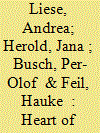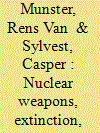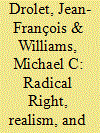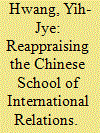|
|
|
Sort Order |
|
|
|
Items / Page
|
|
|
|
|
|
|
| Srl | Item |
| 1 |
ID:
179328


|
|
|
|
|
| Summary/Abstract |
Expert authority is regarded as the heart of international bureaucracies’ power. To measure whether international bureaucracies’ expert authority is indeed recognised and deferred to, we draw on novel data from a survey of a key audience: officials in the policy units of national ministries in 121 countries. Respondents were asked to what extent they recognised the expert authority of nine international bureaucracies in various thematic areas of agricultural and financial policy. The results show wide variance. To explain this variation, we test well-established assumptions on the sources of de facto expert authority. Specifically, we look at ministry officials’ perceptions of these sources and, thus, focus on a less-studied aspect of the authority relationship. We examine the role of international bureaucracies’ perceived impartiality, objectivity, global impact, and the role of knowledge asymmetries. Contrary to common assumptions, we find that de facto expert authority does not rest on impartiality perceptions, and that perceived objectivity plays the smallest role of all factors considered. We find some indications that knowledge asymmetries are associated with more expert authority. Still, and robust to various alternative specifications, the perception that international bureaucracies are effectively addressing global challenges is the most important factor.
|
|
|
|
|
|
|
|
|
|
|
|
|
|
|
|
| 2 |
ID:
179329


|
|
|
|
|
| Summary/Abstract |
The legitimacy of international institutions has in recent years received growing interest from scholars, yet analyses of stakeholder perceptions of the legitimacy of institutions that coexist within a governance field have been few in number. Motivated by the proliferation of institutions in the field of global climate and energy governance, this study maps stakeholder perceptions of legitimate institutions and their sources of legitimacy in global renewable energy governance. Specifically, the article makes three contributions to the existing literature. Theoretically, it unpacks the legitimacy concept and offers a multidimensional conception of legitimacy. Methodologically, it captures these different dimensions of legitimacy by relying on three open survey questions. Empirically, it maps legitimacy perceptions among climate and energy experts and not only shows which institutions are considered most legitimate, but also why they are considered legitimate and how this varies between different stakeholders. The article thereby contributes to the literature on legitimacy by providing new insights into the sources of legitimacy among international institutions that operate under institutional complexity.
|
|
|
|
|
|
|
|
|
|
|
|
|
|
|
|
| 3 |
ID:
179325


|
|
|
|
|
| Summary/Abstract |
In the Anthropocene, International Relations must confront the possibility of anthropogenic extinction. Recent, insightful attempts to advance new vocabularies of planet politics tend to demote the profound historical and intellectual links between our current predicament and the nuclear age. In contrast, we argue that it is vital to revisit the nuclear-environment nexus of the Cold War to trace genealogies of today's intricate constellation of security problems. We do so by reappraising the work of Jonathan Schell (1943–2014), author of The Fate of the Earth (1982), who came to regard extinction as a defining feature of the nuclear age. We show how a deep engagement with nuclear weapons led Schell to an understanding of the Earth as a complex, delicate ecology and fed into a sophisticated, Arendtian theory of extinction. Despite its limitations and tensions, we argue that Schell's work remains deeply relevant for rethinking human–Earth relations and confronting the Anthropocene.
|
|
|
|
|
|
|
|
|
|
|
|
|
|
|
|
| 4 |
ID:
179327


|
|
|
|
|
| Summary/Abstract |
How can we make sure that states do not only sign international anti-corruption conventions, but also comply with them once the ink has dried? Peer review among states offers one answer to this question. This article develops a theoretical framework to study the different processes and mechanisms through which peer reviews can contribute to state compliance. It focuses on three processes: transparency, pressure, and learning. The article subsequently applies this framework to the OECD Working Group on Bribery (WGB) in order to identify how far participants in this peer review perceive the WGB as capable of organising these processes, and to what extent they consider these processes relevant for promoting state compliance. Data come from an online survey (74 observations) and 17 in-depth interviews. The findings reveal that this peer review exercise is perceived as effective in creating transparency about state behaviour, mobilising pressure, and stimulating learning. However, the extent to which these processes can promote compliance is more limited. For these processes to work, political will is crucial.
|
|
|
|
|
|
|
|
|
|
|
|
|
|
|
|
| 5 |
ID:
179324


|
|
|
|
|
| Summary/Abstract |
The rise of the radical Right over the last decade has created a situation that demands engagement with the intellectual origins, achievements, and changing worldviews of radical conservative forces. Yet, conservative thought seems to have no distinct place in the theoretical field that has structured debates within the discipline of IR since 1945. This article seeks to explain some of the reasons for this absence. In the first part, we argue that there was in fact a clear strand of radical conservative thought in the early years of the field's development and recover some of these forgotten positions. In the second part, we argue that the near disappearance of those ideas can be traced in part to a process of ‘conceptual innovation’ through which postwar realist thinkers sought to craft a ‘conservative liberalism’ that defined the emerging field's theoretical alternatives in ways that excluded radical right-wing positions. Recovering this history challenges some of IR's most enduring narratives about its development, identity, and commitments – particularly the continuing tendency to find its origins in a defining battle between realism and liberalism. It also draws attention to overlooked resources to reflect upon the challenge of the radical Right in contemporary world politics.
|
|
|
|
|
|
|
|
|
|
|
|
|
|
|
|
| 6 |
ID:
179326


|
|
|
|
|
| Summary/Abstract |
This article aims to revisit the enterprise of the Chinese School (CS) of IR and discuss how it should be viewed and handled in the discipline, specifically from within the analytical framework of the power/resistance nexus put forward by Foucault, Bhabha, and Spivak. The argument of this article is twofold. Firstly, the CS attempts to reinvigorate traditional Chinese concepts (that is, humane authority, the Tianxia system, and relationality), which mimick Western mainstream IR. These concepts channel the CS into a realist notion of power, a liberal logic of cosmopolitanism, and a constructivist idea of relationality. Thus, the CS uses against the West concepts and themes that the West currently use against the non-Western world. Nevertheless, as the second part of the argument will demonstrate, the enterprise of the CS can still be justified because it can be regarded as a reverse discourse; mimicking yet altering the original meanings of the taken-for-granted concepts, ideas, and principles used by mainstream IR scholars. Moreover, with the judicious use of strategic essentialism, the CS can potentially be one local group in a wider effort to contest diffused and decentred forms of Western domination through linking various struggles to form a unified ‘counter-hegemonic bloc’ of post-Western IR in the discipline.
|
|
|
|
|
|
|
|
|
|
|
|
|
|
|
|
|
|
|
|
|